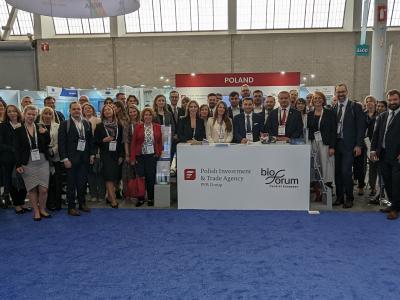Diversification of Industries and Areas - a Recipe for Investment Success in the Biotechnology Sector
Currently, 10 companies with a market value of 3.7 billion PLN from the medical biotechnology sector are listed on the Main Market of the Warsaw Stock Exchange. There are 12 on the NewConnect market. On the other hand, this sector is dynamically developing year after year. It is predicted that by 2027, the Polish red biotechnology market will reach a value of over 21.5 billion PLN. Currently, it is 14.7 billion PLN. What potential for growth the medical biotechnology sector in Poland has, what to pay attention to when diversifying an investment portfolio, what is the development cycle of medical projects, and what opportunities and risks are associated with financing biotechnology companies - these were the topics discussed during the meeting for investors by experts from Dom Maklerski BOŚ, IPOPEMA Securities, BioInMed, and the Polish Development Fund.
The growing population of patients, increasing number of studies, progress in the development of new drugs, and the crisis caused by the COVID-19 pandemic are all contributing to the growth of the biotechnology industry in Poland. In 2021, compared to 2016, the value of investments in R&D (research and development) in the United States has increased by 44%. Furthermore, every year the pipeline of Polish medical biotechnology companies is growing - know-how is strengthening, new companies are emerging, new ideas for projects are appearing - including the development of new drugs, new diagnostic methods and technologies supporting their development, such as artificial intelligence or machine learning.
- Biotechnology is one of the key directions of development in the life science industry, which is increasing its value exponentially every year. Some of the Polish projects have already entered the clinical research phase, some of them have preliminarily proven efficacy and safety in the second phase. However, in most cases, obtaining an international partner is necessary to conduct the third phase of clinical trials - says Marta Winiarska, President of the Polish Association of Innovative Medical Biotechnology Companies BioInMed. - To make the most of the opportunity that the biotechnology sector provides, it is necessary to understand the challenges and prospects we are facing. These projects could allow for a powerful investment leap. The key is consistency, perseverance, and diversification of the investment portfolio both in terms of industries and areas. Only a holistic and thoughtful approach can ensure the ultimate success - adds the expert.
- Medical biotechnology companies have a certain specificity and without understanding it, it is very difficult for investors to achieve good investment results in this sector. We are glad that more and more companies from this sector are appearing on the Stock Exchange. We hope there will be even more of them. The current value of biotechnology companies listed on all markets of the Warsaw Stock Exchange is close to 5 billion PLN. We believe that workshops on investing in medical biotechnology companies will increase investors' knowledge in this area and allow them to understand the investment opportunities and risks in this sector, which in turn will result in the development of this industry – says Maciej Bombol, Head of the Primary Market Department of the Warsaw Stock Exchange.
- The process of developing innovative drugs is very complex and time-consuming - it can take 10-15 years, and the probability of success depends on the therapeutic area, while the higher sales potential of drugs, e.g. from the central nervous system area or oncology, compensates for the relatively lower probability of success in these projects - says Beata Szparaga-Waśniewska, Deputy Head of Equity Research at IPOPEMA Securities. - The valuations of biotechnology companies on the stock exchanges have dropped significantly in recent times. The situation has come to the point where many companies that are part of the NASDAQ Biotechnology index are valued lower than the cash they have on their balance sheet. Sentiment towards the sector may improve if the economic situation on the market improves or if there are large takeover transactions with a premium to the stock market price, which would be a signal to the market that it is already cheap – she summarizes.
– Historically, the pharmaceutical sector has performed about 3% higher than the market. For biotechnology companies, it has been even better in the last 10 years. The accelerated economic development worldwide and the COVID-19 pandemic have led to an increased demand for innovative drugs, particularly personalized treatment. These factors make the biotechnology sector increasingly attractive to investors who reduce investment risk through portfolio diversification - says Zofia Szewczuk, Investment Director, Polish Development Fund. Unfortunately, there is a misconception that small companies have a high "mortality rate", however, in this sector this indicator is actually lower than in other VC transactions. According to the reports of investment and analytical firms, the number of transactions in the biopharmaceutical sector that generate losses is 15% lower than the overall numbers for the entire VC industry, with 20% less invested amounts exposed to transactions resulting in losses. Successful investment in biotechnology at early stages can mean more than 40 percent of IRR over 15 years, covering the costs of many failed investments. However, it should be remembered that the probability of reaching the commercialization phase of an oncological drug, which is one of the most risky, before phase I is on average about 5%. The probability of success increases to around 8% after a successful Phase I. Diversifying the portfolio significantly increases the likelihood of at least one success - explains the expert.
- It is predicted that global spending on medicines will increase from $1.3 trillion in 2020 to $1.6 trillion in 2024. The main drivers of growth include: increased health care and drug accessibility, the emergence of new therapies, and an aging population and increased number of people - says Sylwia Jaśkiewicz, Managing Director of the Analysis and Recommendations Department at BOŚ Brokerage House. - Biologics, gene and cell therapies have gained particular importance in recent years, although small molecule drugs still make up the majority of pharmaceutical manufacturers' revenues. It is estimated that in the years 2020-2026, new modalities, including next-generation antibodies, cell and gene therapies, DNA and RNA-based therapies, bioengineering vaccines, and genetically modified drugs will account for 17% of drug sales, 43% will be generated by biological drugs, and 40% by conventional drugs. Innovative solutions will appear beyond market leaders and classes of drugs with established positions. In the oncology sector, new players will dominate.
- In 2021, the FDA approved 50 new drugs, of which 33 were small molecule drugs, 17 were monoclonal antibodies and other large molecule drugs. Simultaneously, so-called advanced therapies such as gene or cell therapies are also being developed. In Poland, research in each of these categories is currently being conducted pre-clinically or clinically. For this reason, it is particularly important to have support for this sector from both private and public investors. Today, we are building the future of Polish business and creating the opportunity to join the elite group of countries where new drugs are developed to meet unsatisfied health needs. For success, not only the appropriate know-how and scientific knowledge are necessary, but also stable financing of projects. This risky investment, with proper diversification, can bring multiple returns - says Marta Winiarska, President of the Polish Association of Innovative Medical Biotechnology Companies BioInMed. - In the days of oil lamps, few believed that the idea of capturing light in a glass would be possible. Although this idea seemed crazy back then, today we cannot imagine life without electric lighting. It is important that we support modern innovators. This is all the more true given that, despite the young age of the medical biotechnology sector, we already have examples of successful investments in Poland - summarizes Marta Winiarska.



